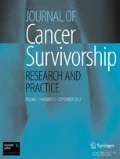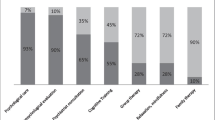Abstract
Purpose
Psychosocial screening is increasingly applied to childhood cancer survivors generally, but less so with pediatric brain tumor survivors despite their psychosocial risks. This study examined the utility and acceptability of psychological screening in pediatric brain tumor survivors.
Methods
Eighty-four adolescents (age 12–18) completed the Beck Youth Inventory-II and 79 young adults (age 19–30) completed the Brief Symptom Inventory-18. Their scores were compared to clinician ratings on the global assessment of functioning following clinical interviews.
Results
Eighty-four percent of participants completed measures in <30 min, 90 % reported no associated distress, and 98 % found measures easy to understand. Using established cut-off scores, 14 adolescents (17 %) and 21 young adults (27 %) were identified as clinical cases by self-report. Agreement with clinician report was generally low (kappa = .19, p = .077, adolescents; kappa = .34, p = .003, young adults), with clinicians tending to rate a higher proportion of both groups as having significant distress (24 % in adolescents; 32 % in young adults). Low self-concept scores in adolescents and deficits in social and vocational functioning in young adults contributed significantly to the discrepancies between self-report and clinician ratings.
Conclusions
Pediatric brain tumor survivors are capable of completing self-report psychological measures without distress or burden. Self-report can be a valuable tool in the assessment of pediatric brain tumor survivors, particularly in adolescents, who may provide information not revealed in a clinical interview. However, self-report, should not be used as a “stand-alone” assessment because important areas of functioning may be minimized in survivors’ reports.
Implications for cancer survivors
Utilizing self-report for psychosocial screening of adolescent and young adult brain tumor survivors may enhance clinical care and allow for better identification of survivors in need of psychological services.


Similar content being viewed by others
References
Gurney JG, Smith MA, Bunin GR. CNS and miscellaneous intracranial and intraspinal neoplasms. In: Ries LAG, Smith MA, Gurney JG, Linet, M, Tamara T, Young L, Bunin GR, editors. Cancer incidence and survival among children and adolescents: United States SEER program 1975–1999. Bethesda, MD: SEER Program, National Cancer Institute (NIH publication No. 99-4649). 1999. p. 51–64.
Smith MA, Ries LA. Childhood cancer: incidence, survival, and mortality. In: Pizzo PA, Poplack DG, editors. Principles and practice of pediatric oncology. Philadelphia: Lippincott; 2002. p. 1–12.
Anderson DM, Rennie KM, Ziegler RS, Neglia JP, Robison LR, Gurney JG. Medical and neurocognitive late effects among survivors of childhood central nervous system tumors. Cancer. 2001;92:2709–19.
Mostow EN, Byrne J, Connelly RR, Mulvihill JJ. Quality of life in long-term survivors of CNS tumors of childhood and adolescence. J Clin Oncol. 1991;9:592–9.
Packer R, Gurney JG, Punyko JA, Donaldson SS, Inskip PD, Stovall M, et al. Long-term neurologic and neurosensory sequelae in adult survivors of a childhood brain tumor: Childhood Cancer Survivor Study. J Clin Oncol. 2003;21:3255–61.
Butler RW, Haser JK. Neurocognitive effects of treatment for childhood cancer. MRDD Research Reviews. 2006;12:184–91.
Ris MD, Beebe DW, Armstrong FD, Fontanesi J, Holmes E, Sanford RA, et al. Cognitive and adaptive outcome in extracerebellar low-grade brain tumors in children: a report from the Children’s Oncology Group. J Clin Oncol. 2008;26:4765–70.
Zeltzer LK, Recklitis C, Buchbinder D, Zebrack B, Casillas J, Tsao JCI, et al. Psychological status in childhood cancer survivors: a report from the Childhood Cancer Survivor Study. J Clin Oncol. 2009;27:2396–02.
Zebrack BJ, Gurney JG, Oeffinger K, Whitton J, Packer RJ, Mertens A, et al. Psychological outcomes in long-term survivors of childhood brain cancer: a report from the Childhood Cancer Survivor Study. J Clin Oncol. 2004;22:999–06.
Recklitis CJ, Diller LR, Li X, Najita J, Robison LL, Zeltzer L. Suicide ideation in adult survivors of childhood cancer: a report from the Childhood Cancer Survivor Study. J Clin Oncol. 2010;28:655–61.
Treadgold CL, Kuperberg A. Been there, done that, wrote the blog: the choices and challenges of supporting adolescents and young adults with cancer. J Clin Oncol. 2010;28:1–9.
Clinton-McHarg T, Carey M, Sanson-Fisher R, Shakeshaft A, Rainbird K. Measuring the psychosocial health of adolescent and young adult (AYA) cancer survivors: a critical review. Health Qual Life Outcomes. 2010;8:25.
National Cancer Institute, Adolescent and Young Adult Oncology Progress Review Group: Closing the Gap: Research and Care Imperatives for Adolescents and Young Adults with Cancer-Report of the Adolescent and Young Adult Oncology Progress Review Group, 2006.
Langeveld NE, Stam H, Grootenhuis MA, Last BF. Quality of life in young adult survivors of childhood cancer. Support Care Cancer. 2002;10:579–00.
Fuemmeler BF, Elkin TD, Mullins LL. Survivors of childhood brain tumors: behavioral, emotional, and social adjustment. Clin Psychol Rev. 2002;22:547–85.
Meyer EA, Kieran MW. Psychological adjustment of ‘surgery-only’ pediatric neuro-oncology patients: a retrospective analysis. Psychooncology. 2002;11:74–9.
Bhat SR, Goodwin TL, Burwinkle TM, Lansdale MF, Dahl GV, Huhn SL, et al. Profile of daily life in children with brain tumors: an assessment of health-related quality of life. J Clin Oncol. 2005;23:5493–00.
Meeske KA, Ruccione K, Globe DR, Stuber ML. Posttraumatic stress, quality of life and psychological distress in young adult survivors of childhood cancer. Oncol Nurs Forum. 2001;28:481–9.
US Department of Health and Human Service. Living beyond cancer: finding a new balance. President’s Cancer Panel 2003-2004 Annual Report. 2003.
Rourke MT, Hobbie WL, Schwartz L, Kazak AE. Posttraumatic stress disorder (PTSD) in young adult survivors of childhood cancer. Pediatr Blood Cancer. 2007;49:177–82.
Holland JC, Reznik I. Pathways for psychosocial care of cancer survivors. Cancer. 2005;11:2624–37.
Recklitis CJ, O’Leary T, Diller L. Utility of routine psychological screening in the childhood cancer survivor clinic. J Clin Oncol. 2003;21:787–92.
Recklitis C, Parsons S, Shih M, Mertens A, Robison L, Zeltzer L. Factor structure of the Brief Symptom Inventory (BSI)-18 in adult survivors of childhood cancer: a report from the Childhood Cancer Survivor Study. Psychol Assess. 2006;18:22–2.
Recklitis CJ, Rodriguez P. Screening childhood cancer survivors with the Brief Symptom Inventory-18 (BSI-18): classification agreement with the Symptom Checklist-90-Revised. Psychooncology. 2007;16:429–36.
American Psychiatric Association. Diagnostic and statistical manual of mental disorders: DSM-IV-TR. 4th ed. Washington, DC: American Psychiatric Association; 2000.
Beck JS, Beck AT, Jolly JB, Steer RA. Manual for Beck Youth Inventories—Second Edition for children and adolescents. Oxford: Harcourt Assessment; 2005.
Derogatis LR. BSI-18 administration, scoring, and procedures manual. National Computer Systems: Minneapolis; 2000.
Merport A, Recklitis CJ. Does the Brief Symptom Inventory-18 case rule apply in adult survivors of childhood cancer?: Comparison with the Symptom Checklist-90. J Pediatr Psychol. 2012;27:650–9.
Zabora J, Brintzenhofeszoc K, Jacobsen P, Curbow B, Piantadosi S, Hooker C, et al. A new psychosocial screening instrument for use with cancer patients. Psychosomatics. 2001;42:241–6.
Gurney JG, Krull KR, Kadan-Lottick N, Nicholson HS, Nathan PC, Zebrack B, et al. Social outcomes in the Childhood Cancer Survivor Study cohort. J Clin Oncol. 2009;27:2390–5.
Recklitis CR, Liptak C. Psychological challenges and adaptation in long-term survivors of childhood cancer. In: Mucci G, editor. Handbook of long term care of the childhood cancer survivor. 2012. (in press).
Acknowledgments
This work was supported in part by the Children’s Brain Tumor Foundation and the Brain Tumor Network.
Author information
Authors and Affiliations
Corresponding author
Rights and permissions
About this article
Cite this article
Liptak, C., Manley, P. & Recklitis, C.J. The feasibility of psychosocial screening for adolescent and young adult brain tumor survivors: the value of self-report. J Cancer Surviv 6, 379–387 (2012). https://doi.org/10.1007/s11764-012-0237-7
Received:
Accepted:
Published:
Issue Date:
DOI: https://doi.org/10.1007/s11764-012-0237-7



